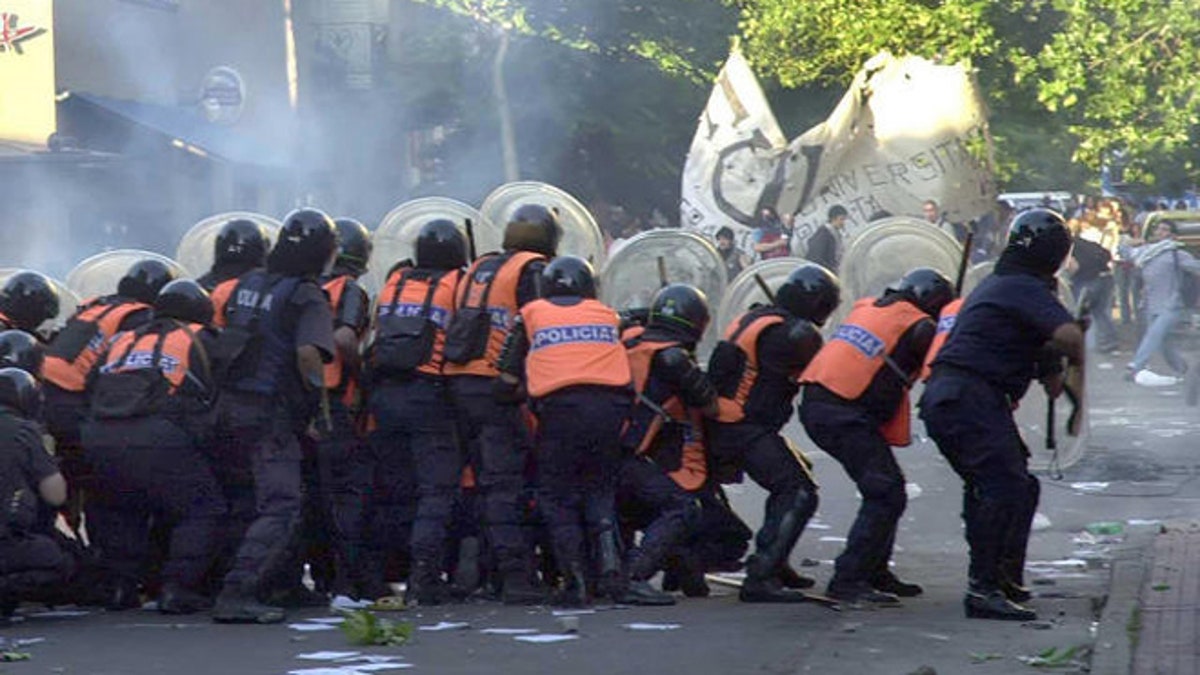
Riot police fire rubber bullets and tear gas at demonstrators in La Plata, Argentina, Tuesday, Nov. 28, 2006 as members of human right groups were trying to approach the house of a former police officer under house arrest for violating human rights during the military regime in the 1970's. Demonstrators marched to demand the safe return of a witness who disappeared two months ago after testifying in a human rights trial dating from Argentina's "Dirty War." (AP Photo/Telam, Carlos Carmele) ((AP Photo/Telam, Carlos Carmele))
The Latin American countries with greatest numbers of conflicts are those with broad social inequalities, according to a United Nations report released earlier this week.
In countries such as Argentina, Bolivia and Peru, where social conflict is deemed to very high, the UN found that there is a limited capacity to manage unrest and that conflict ultimately determines the effectiveness of that country’s political process.
The countries with the lowest levels of unrest are Costa, Chile and El Salvador.
“Democracies, as opposed to authoritarian regimes, enable social conflict as a constructive tool for peoples’ demands for improved quality of life,” said Heraldo Muñoz, the UN Development Programs Director for Latin America and the Caribbean, in a press release.
The report categorized unrest as social, institutional and cultural tensions and said that the unrest in Latin America is numerous compared to other regions and is characterized by a high degree of citizen participation.
- ‘Cross Country’ Cross Controversy
- ‘Illegal Immigrant Hunting Permit’ Sticker Draws Anger in Colorado
- ‘Racist’ Mexican Costumes by Penn State, Baylor Students Under Investigation
- United Nations: Obama & Other Leaders Discuss Economy and Unrest
- ‘UndocuBus’ Heads Toward Democratic Convention Demanding Immigration Reform
- Best Pix Of The Week
- Best Sports Pix Of The Week
- Jobless Mexicana Flight Attendants Pose for Calendar
Muñoz said that depending on how they are managed, social conflicts can just as easily become gateways for change as opposed to destruction.
“If they are managed through dialogue and negotiation and their causes are addressed, they are great opportunities for profound transformations – and for a more equitable and just Latin America,” he added.
The UN’s findings seem counterintuitive to the political and social climates in many Latin American countries. Despite some anti-government sentiments in both Argentina and Bolivia, the two countries are generally deemed by experts to have relatively stable – if poorly managed – governments.
El Salvador, on the other hand, has widespread problems with violence related to the country’s maras, or gangs, and Chile has been dealing with student and environmental protests since the start of President Sebastián Piñera’s time in office.
The report also found that just under 60 percent of the organizations and individuals involved in social conflicts had a presence on the Internet.
“The Internet and other communications technologies allow social movements to interact, spread messages through videos and raise funds,” the UNDP news release stated. “Such tools have also been increasingly important for historically marginalized groups, including indigenous peoples.”
Follow us on twitter.com/foxnewslatino
Like us at facebook.com/foxnewslatino








































